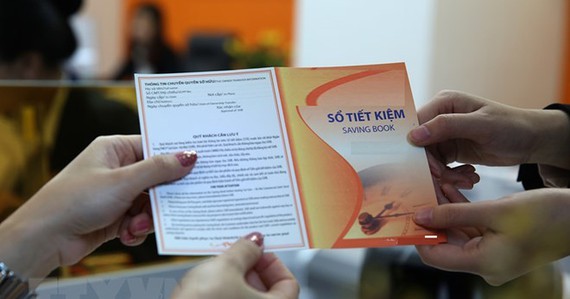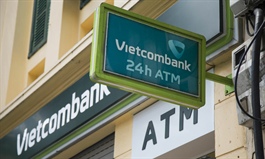Mortgage loans on savings book still common
Mortgage loans on savings book still common
Although the State Bank of Vietnam has warned against taking out loans on savings books, this practice is still very much prevalent and even gaining in popularity recently, especially during the Covid-19 pandemic when people are facing hard times. Commercial banks too are making a beeline to increase their cash flow by the end of the year due to a serious decline in credit growth.
Illustrative photo.
|
his practice is still very much prevalent and even gaining in popularity recently, especially during the Covid-19 pandemic when people are facing hard times. Commercial banks too are making a beeline to increase their cash flow by the end of the year due to a serious decline in credit growth.
Easy access to loans
By just going to Google and typing "mortgage loans on savings book", a list of banks pop up and offer all kinds of mortgage loans on savings books, with a limit of upto 95% or sometimes even 100% of savings book value, in very quick and simple steps. This means that if a customer has a savings book with tens of billions of dong, the customer can get a mortgage loan that will be equivalent to that number without having to withdraw money from the savings book. Not only that, in this form of lending, the procedures are very simple and the bank disburses cash immediately without asking the borrower of his actual need. The borrower does not have to declare anything or even offer a collateral.
As it happens, many customers save money and then when they need money for any other work urgently, they look towards any form of loan because if they withdraw their deposit before maturity, they will have to bear very low interest rate. Therefore, many people choose to borrow on their savings book, accepting a higher interest rate than the deposit interest rate, but with a shorter term. By this approach, the customer benefits. On the other hand, lending banks also benefit when the lending interest rate is 3% to 4% higher than the interest paid to savings depositors.
However, this form of mortgage loan is a not always a win-win situation for either side. In 2014, the case of the Vietnam Construction Joint Stock Commercial Bank (VNCB) shook the financial world of banking. The case involved the chairman of the Board of Directors along with several other leaders of the bank, and the complexities of the case entangled the bank for next following few years.
At that time, VNCB took out mortgage loans on borrower deposits. The chairman of the Board of Directors of VNCB pledged a large amount of deposits at other banks and offered guarantee from companies and their alliances. These alliance subsidiaries did not have money to pay back and with the bank unable to collect the debt amounts, the subsequent damage caused to VNCB was immense. The indictment in the case clearly shows that the approval of the above loans by the banks was irresponsible, and the borrowers used the capital for all the wrong purposes. Until the appellate trial, the legitimacy of the loans and the fate of the pledged money was under fierce dispute between both parties.
Nonetheless, over the years, many businesses have also been using this form of pledged loan taken on savings books. If a business is in need of a bank loan of about VND one billion, it will have to go through many steps to get the loan, besides presenting a whole set of legal documents required by the bank. However, if this enterprise hires a service operator to open a savings book with equivalent of VND one billion in deposit and shortly thereafter the service operator proceeds to pledge the savings book to the bank to access the required loan, the business can access a loan very easily. In this way, the business gets the loan on a much lower interest rate, and also avoids going through several layers of procedures that are generally needed for approval of a loan from a bank.
Misuse of savings book
When a customer needs capital but the savings book has not yet matured, the option is to pledge the savings book to borrow from the bank. Banks are willing to lend on savings books because they do not need to prove any strict plan on use of capital or show any other form of collateral. When the State Bank of Vietnam proposed a roadmap to reduce short-term loans, banks continued to encourage customers to deposit long-term savings and did not refuse mortgage loans on savings books. This practice has been more rigorously applied during the ongoing Covid-19 pandemic, as almost all commercial banks are racing against time to increase their declining credit limit before the end of the year.
According to lawyer Truong Thanh Duc, Chairman of Board of Members of Basico Law Firm, many banks are now taking advantage of this method to boost credit growth, especially when preparing to close data for the year. This form of lending has been applied by many banks, especially after the State Bank of Vietnam assigned a credit growth target to each bank to reverse the detrimental impact of the Covid-19 pandemic. For example, when the State Bank of Vietnam assigns a credit growth target till the end of the year, commercial banks can use several loan-deposit schemes to increase a few credit percent, assign higher quotas, or dodge procedures to create a cycle of savings, and also pledge savings book to borrow and then deposit again.

























